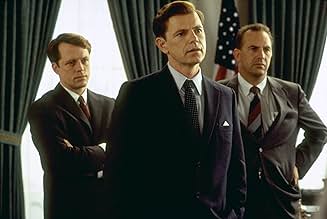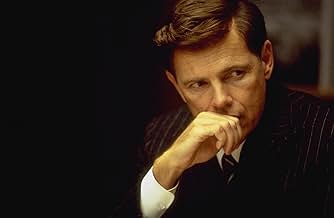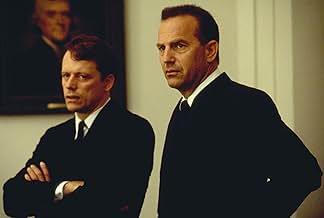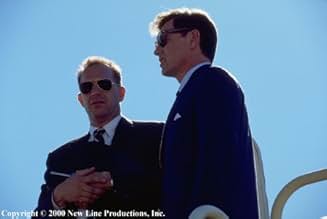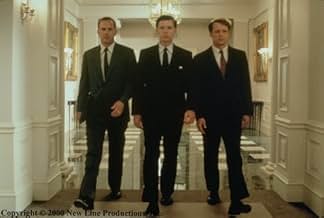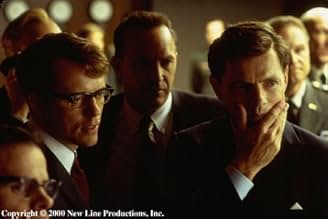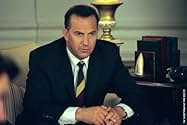In October 1962, the Kennedy administration struggles to contain the Cuban Missile Crisis.In October 1962, the Kennedy administration struggles to contain the Cuban Missile Crisis.In October 1962, the Kennedy administration struggles to contain the Cuban Missile Crisis.
- Director
- Writers
- Stars
- Awards
- 3 wins & 8 nominations total
- Director
- Writers
- All cast & crew
- Production, box office & more at IMDbPro
7.366K
1
2
3
4
5
6
7
8
9
10
Featured reviews
Thirteen Days was a wonderfully acted, wonderfully told story about the 13 days of the Cuban Missile Crisis, a time when the world almost came to an end.
Shown through the eyes of presidential aide Kenneth P. O'Donnell (Kevin Costner), we see the inner workings of President John F. Kennedy (Bruce Greenwood) and his closest advisors as they try and find the best way to end a potentially devastating showdown with the U.S.S.R. In October of 1962, the U.S., during a regular mission photographing Cuba, spotted a missile buildup by the Russians. The missiles were powerful enough to kill 80 million Americans with only 5 minutes of warning time. President Kennedy had to decide quickly what action to take. With his trusted aide Kenny O'Donnell and his brother Attorney General Robert F. Kennedy (Steven Culp), and others such as Robert McNamara, Adlai Stevenson, McGeorge Bundy, Dean Acheson, Dean Rusk, and many more, Kennedy needed to figure out the best course of action. If he allowed the Russians to aim these missiles at the U.S., the United States would be placed in a potentially deadly situation. If Kennedy allowed the military to attack the missiles and destroy them, what would Russia do as a response? If he waited too long, would Russia simply attack the U.S.? If he backed down and agreed to take down U.S. missiles in Turkey, would the U.S. then look weak to the rest of the world? For such a young President, Kennedy had a lot of tough decisions to make, in a short amount of time, with the world hanging in the balance.
I wasn't alive during the Cuban Missile Crisis as it occurred, so seeing Thirteen Days was like having a history lesson at the same time as having great entertainment. Even though I knew that we didn't end up in World War III, there were a lot of things I didn't know. I won't go into any of the specifics, but I never fully understood how close we came to destroying the planet. The tensions of the time were brought out successfully by director Roger Donaldson. You could see and feel the sweat on all the major players as each minute ticked by. Bruce Greenwood did a tremendous job as the young President Kennedy, showing how Kennedy was strong enough to stand by his morals and values, even as his most trusted advisors were urging him to go to war. At the same time, Greenwood was able to portray Kennedy as someone who needed help and was able to turn to his brother for guidance. Kevin Costner did a good job as Kennedy's presidential aide. I especially liked his boston accent. Costner was a strong personality that worked well with Greenwood and Steven Culp. I believed that the three of them were friends for 15 years and that they trusted each other with their own lives. Other acting standouts to me were Dylan Baker as Robert McNamara and Michael Fairman as Adlai Stevenson.
Even running at almost two and a half hours, I was always at the edge of my seat, wondering what was going to happen next. Like I said before, I wasn't even born yet, nor was it something I ever learned about in school, so I had no idea what was going to happen. It was nice being able to get deep inside the mind of these important people during this crucial time. Of course, I have no idea if what was said during these meetings was actually said in real life, but I'd like to believe that at least the outcomes of the meetings were true. I'm a big fan of these kinds of dramatic films based on real life events. While being entertaining, they also have the ability to teach you about history. Reading about these situations in books isn't nearly as enjoyable as being able to watch them on screen. I think screenwriter David Self did a great job of bringing these real life events to life on the big screen. He made it historical but didn't bore you with too much talk or information. Along with Donaldson, he gave you what you needed to know, and let the actors bring you into the action.
So overall, I thought Thirteen Days was a great film. Well acted, well directed, well written, nice musical score and very entertaining throughout. And if you happen to learn something along the way like I did, then even better.
I wasn't alive during the Cuban Missile Crisis as it occurred, so seeing Thirteen Days was like having a history lesson at the same time as having great entertainment. Even though I knew that we didn't end up in World War III, there were a lot of things I didn't know. I won't go into any of the specifics, but I never fully understood how close we came to destroying the planet. The tensions of the time were brought out successfully by director Roger Donaldson. You could see and feel the sweat on all the major players as each minute ticked by. Bruce Greenwood did a tremendous job as the young President Kennedy, showing how Kennedy was strong enough to stand by his morals and values, even as his most trusted advisors were urging him to go to war. At the same time, Greenwood was able to portray Kennedy as someone who needed help and was able to turn to his brother for guidance. Kevin Costner did a good job as Kennedy's presidential aide. I especially liked his boston accent. Costner was a strong personality that worked well with Greenwood and Steven Culp. I believed that the three of them were friends for 15 years and that they trusted each other with their own lives. Other acting standouts to me were Dylan Baker as Robert McNamara and Michael Fairman as Adlai Stevenson.
Even running at almost two and a half hours, I was always at the edge of my seat, wondering what was going to happen next. Like I said before, I wasn't even born yet, nor was it something I ever learned about in school, so I had no idea what was going to happen. It was nice being able to get deep inside the mind of these important people during this crucial time. Of course, I have no idea if what was said during these meetings was actually said in real life, but I'd like to believe that at least the outcomes of the meetings were true. I'm a big fan of these kinds of dramatic films based on real life events. While being entertaining, they also have the ability to teach you about history. Reading about these situations in books isn't nearly as enjoyable as being able to watch them on screen. I think screenwriter David Self did a great job of bringing these real life events to life on the big screen. He made it historical but didn't bore you with too much talk or information. Along with Donaldson, he gave you what you needed to know, and let the actors bring you into the action.
So overall, I thought Thirteen Days was a great film. Well acted, well directed, well written, nice musical score and very entertaining throughout. And if you happen to learn something along the way like I did, then even better.
Factual??
I served aboard the USS Joseph P. Kennedy which was depicted in the film. The Kennedy was the ship that boarded the Marcula in the waters off the Bahamas. The Kennedy, now part of Battleship cove in Fall River, Ma., actually played herself in the film. The actual boarding was not as quite dramatic as depicted in the movie.
The boarding party for instance did not wear dress white uniforms and the Marcula was more of a "rust bucket" than depicted in the movie. Although the 5 inch guns were aimed at the vessel, I don't recall a shot being fired.
As far as the movie is concerned I though it gave a rather accurate accounting of the circumstances that surrounded this time in history with a few embellishment's that are purely thrown in as theatrical license.
The boarding party for instance did not wear dress white uniforms and the Marcula was more of a "rust bucket" than depicted in the movie. Although the 5 inch guns were aimed at the vessel, I don't recall a shot being fired.
As far as the movie is concerned I though it gave a rather accurate accounting of the circumstances that surrounded this time in history with a few embellishment's that are purely thrown in as theatrical license.
Almost the end of civilization as we know it.
I watched this movie today with a number of students from my International Politics class, and from the standpoint of a politics professor, this film was absolutely extraordinary. This is a movie about the development of foreign policy in a crisis; it spells out with brilliant detail the decision-making process of JFK's inner circle, the tension between the Executive Office of the President and the Departments of State and Defense, and the attempts by the Military Industrial Complex (namely the Joint Chiefs) to undermine the diplomatic approaches favored by the president. It highlights the conflict between military standard operating procedures ("rules of engagement") and the better judgment/common sense of right-thinking human beings. It hints at conspiracies to (later) depose and otherwise get rid of both Kennedy and Khruschev from within for what turned out to be a very unpopular resolution with the hardliners on both sides. I especially like that the movie acknowledged the humanity of the individual decision-makers without getting too Capra-esquire or preachy.
I can see why this film hasn't been a great commercial success. It is not your standard big studio fare. It's quite cerebral, and although it has some exciting pre-conflict scenes, it's not a "war film". (It reminds me a bit of "Three Kings" in that regard- both films were, in my opinion, mis-marketed. They both seemed to target the younger male action crowd, when both movies are really made for a more intellectual audience.) I liked how the Soviets were not cartoonishly vilified, as is common in a lot of Cold War era films. They were shown to be somewhat calculating and strategic, but not irrational or more importantly, inhuman. In fact, one of the most fascinating parts of the film is the revelation that both sides lack information as to the other side's true intentions. It was this uncertainty that back in October 1962, could have led to the end of civilization as we know it.
The acting was solid (Steven Culp was very, very good as Robert Kennedy- so good, in fact, that I'm afraid he'll have a hard time getting cast in the future. There was audible gasp in the audience when he came on the screen and WAS Bobby). Coaster's accent was actually annoying (as an earlier reviewer noted), but it's forgivable in light of the moving, somewhat understated performance he turns in. It is the directing that takes the cake, however. From the moment the chain of events was set in motion, the tension does NOT let up. It actually feels like you are back in 1962 living through the events of those two weeks- honestly, there was nary a moment to relax until the resolution was wrought. I recommend this film especially strongly to high school and college age students who are too young to have any Cold War memory, as well as to those who lived through the era and may have forgotten what it felt like to come this close.
I can see why this film hasn't been a great commercial success. It is not your standard big studio fare. It's quite cerebral, and although it has some exciting pre-conflict scenes, it's not a "war film". (It reminds me a bit of "Three Kings" in that regard- both films were, in my opinion, mis-marketed. They both seemed to target the younger male action crowd, when both movies are really made for a more intellectual audience.) I liked how the Soviets were not cartoonishly vilified, as is common in a lot of Cold War era films. They were shown to be somewhat calculating and strategic, but not irrational or more importantly, inhuman. In fact, one of the most fascinating parts of the film is the revelation that both sides lack information as to the other side's true intentions. It was this uncertainty that back in October 1962, could have led to the end of civilization as we know it.
The acting was solid (Steven Culp was very, very good as Robert Kennedy- so good, in fact, that I'm afraid he'll have a hard time getting cast in the future. There was audible gasp in the audience when he came on the screen and WAS Bobby). Coaster's accent was actually annoying (as an earlier reviewer noted), but it's forgivable in light of the moving, somewhat understated performance he turns in. It is the directing that takes the cake, however. From the moment the chain of events was set in motion, the tension does NOT let up. It actually feels like you are back in 1962 living through the events of those two weeks- honestly, there was nary a moment to relax until the resolution was wrought. I recommend this film especially strongly to high school and college age students who are too young to have any Cold War memory, as well as to those who lived through the era and may have forgotten what it felt like to come this close.
Good view on possibly the most tense thirteen days of the 20th century.
Basically this movie is a great history lesson. If you want to know more about the cold war and the Cuba missile crisis in particular this is a perfect medium for you to start with. The movie is quite detailed and accurate even though of course some moments and characters have been 'over-dramatized' for the good of the movie and its flow and emotions.
Even though you already know from start till finish how this movie is going to end, it still is a tense movie to watch. The story is build up well and makes the movie really interesting and compelling to follow. It perfectly captures the tension of the whole crisis and really makes you realize how close the world actually came to a WW III. It makes us aware of the fact that those 13 days in history should always be remembered and used as a lesson for the entire world now and forever. It's too bad that the movie becomes a bit too moralistic at times, especially toward the ending.
Bruce Greenwood doesn't really look like JFK but he's a good actor, so he becomes believable enough in his role trough his acting skills. Steven Culp really does look like Robert Kennedy and on top of that he also is a great actor. I wasn't always happy with Kevin Costner performance but overall he did an acceptable job. There are some weaker moments which involves his character but I more blame those moments to the at times too moralistic written script.
A bit of a disappointing aspect of the whole movie is its style. Roger Donaldson at times tries to be over-artistic and mixes the movie with black & white and color images. Perhaps he tried to copy Oliver Stone's style? Who knows. The cinematography was also disappointingly standard but thankfully the good editing saved this a little. Also the musical score by Trevor Jones is surprisingly solid.
Overall it's a very good political movie that has some great tense and important moments in it and also works great as a history lesson.
8/10
http://bobafett1138.blogspot.com/
Even though you already know from start till finish how this movie is going to end, it still is a tense movie to watch. The story is build up well and makes the movie really interesting and compelling to follow. It perfectly captures the tension of the whole crisis and really makes you realize how close the world actually came to a WW III. It makes us aware of the fact that those 13 days in history should always be remembered and used as a lesson for the entire world now and forever. It's too bad that the movie becomes a bit too moralistic at times, especially toward the ending.
Bruce Greenwood doesn't really look like JFK but he's a good actor, so he becomes believable enough in his role trough his acting skills. Steven Culp really does look like Robert Kennedy and on top of that he also is a great actor. I wasn't always happy with Kevin Costner performance but overall he did an acceptable job. There are some weaker moments which involves his character but I more blame those moments to the at times too moralistic written script.
A bit of a disappointing aspect of the whole movie is its style. Roger Donaldson at times tries to be over-artistic and mixes the movie with black & white and color images. Perhaps he tried to copy Oliver Stone's style? Who knows. The cinematography was also disappointingly standard but thankfully the good editing saved this a little. Also the musical score by Trevor Jones is surprisingly solid.
Overall it's a very good political movie that has some great tense and important moments in it and also works great as a history lesson.
8/10
http://bobafett1138.blogspot.com/
Taut Thriller
This is an outstanding re-telling of the Cuban Missile Crisis. The weakest part of the movie of course is Kevin Costner who wisely cast himself in the part of presidential assistant Kenny O'Donnell rather than take on the JFK role. In order to give Costner a lot to do they make Kenny O'Donnell out to be a sort of behind-the-scenes king-maker rather than the office gofer that he probably really was. But it was a clever device to get the audience into the inner workings of the Kennedy White House without making JFK or RFK the lead character. The scenes that work best are when O'Donnell is the fly-on-the-wall sitting in at Cabinet meetings and meetings with the Joint Chiefs and letting the real decision-makers and advisers talk.
Much of the real JFK Cabinet discussions were recorded or transcribed for history and so I'm sure that much of the dialog for those scenes is what the principals really said. The movie is a tremendous look at crisis management and decision-making under extreme pressure.
The military leaders are made out to be the semi-villains in this movie, pushing JFK to attack Cuba and launch WWIII and at some points seeming to even disobey or skirt his orders. When watching the movie I kept remembering that JFK was the youngest man ever elected president and that he was only 45 yrs old when this happened. Most of his Cabinet and all of the Joint Chiefs were much older than him and that tension comes across as the older men seem to barely be able to hold back their condescending attitudes towards the young president.
With the exception of Costner, the acting in this movie is first rate and Bruce Greenwood as JFK was certainly deserving of Oscar consideration. It is always hard for an actor to play a historical figure like JFK who is more legend now than man. Greenwood wisely does not try to mimic JFK's accent but he does get inside the character and you can see JFK thinking his way through the crisis with nothing less than future of the entire human race riding on his decisions. Steven Culp was outstanding as well as RFK, perfectly mimicking RFK's mannerisms and way of speaking but again, getting inside the character so we can really see the man rather than just an impersonation. The success of the entire movie depending on Greenwood and Culp nailing their parts and they did so terrifically.
Viewers might be interested in finding a copy of "Missiles of October" which was a TV-movie in the 1970s and done much like a stage play. William Devane played JFK and Martin Sheen RFK. The movie also gave much screen time to the Kruschev character.
Much of the real JFK Cabinet discussions were recorded or transcribed for history and so I'm sure that much of the dialog for those scenes is what the principals really said. The movie is a tremendous look at crisis management and decision-making under extreme pressure.
The military leaders are made out to be the semi-villains in this movie, pushing JFK to attack Cuba and launch WWIII and at some points seeming to even disobey or skirt his orders. When watching the movie I kept remembering that JFK was the youngest man ever elected president and that he was only 45 yrs old when this happened. Most of his Cabinet and all of the Joint Chiefs were much older than him and that tension comes across as the older men seem to barely be able to hold back their condescending attitudes towards the young president.
With the exception of Costner, the acting in this movie is first rate and Bruce Greenwood as JFK was certainly deserving of Oscar consideration. It is always hard for an actor to play a historical figure like JFK who is more legend now than man. Greenwood wisely does not try to mimic JFK's accent but he does get inside the character and you can see JFK thinking his way through the crisis with nothing less than future of the entire human race riding on his decisions. Steven Culp was outstanding as well as RFK, perfectly mimicking RFK's mannerisms and way of speaking but again, getting inside the character so we can really see the man rather than just an impersonation. The success of the entire movie depending on Greenwood and Culp nailing their parts and they did so terrifically.
Viewers might be interested in finding a copy of "Missiles of October" which was a TV-movie in the 1970s and done much like a stage play. William Devane played JFK and Martin Sheen RFK. The movie also gave much screen time to the Kruschev character.
Did you know
- TriviaPresident John F. Kennedy very frequently set up recording machines during meetings at the White House. Much of the dialogue from the movie is taken directly from Kennedy's tapes.
- GoofsPresident Kennedy wanted an eyewitness account so badly that Commander Ecker was ordered to the Pentagon to brief the Joint Chiefs of Staff immediately after landing his RF-8A Crusader, sweaty flight suit and all. This is often thought to be a glaring error in the movie, but his attire is absolutely accurate. Cdr. Ecker was not even allowed to exit his Crusader when he landed at NAS Cecil Field, Jacksonville FL. His film canisters were unloaded from his aircraft, he was refueled and sent immediately to Washington D.C., landing at Andrews AFB and whisked by limousine directly to the Pentagon where he met with the Joint Chiefs of Staff, apologizing right away for appearing at the briefing in his sweat-soaked flight suit. Cdr. Ecker, parched from the Cuba overflight and then the flight north to Washington, asked in a hoarse voice for a drink of water when he arrived. He refuses it in the movie.
- Quotes
Kenny O'Donnell: If the sun comes up tomorrow, it is only because of men of good will. And that's - that's all there is between us and the devil.
- ConnectionsEdited from Trinity and Beyond: The Atomic Bomb Movie (1995)
Details
- Release date
- Country of origin
- Languages
- Also known as
- Trece días
- Filming locations
- Production companies
- See more company credits at IMDbPro
Box office
- Budget
- $80,000,000 (estimated)
- Gross US & Canada
- $34,592,089
- Opening weekend US & Canada
- $46,668
- Dec 25, 2000
- Gross worldwide
- $66,579,890
- Runtime
- 2h 25m(145 min)
- Color
- Sound mix
- Aspect ratio
- 1.85 : 1
Contribute to this page
Suggest an edit or add missing content







